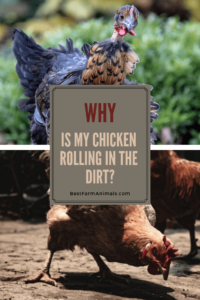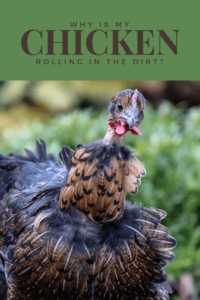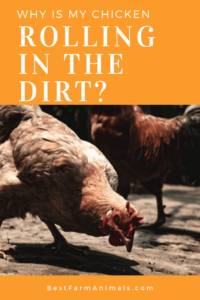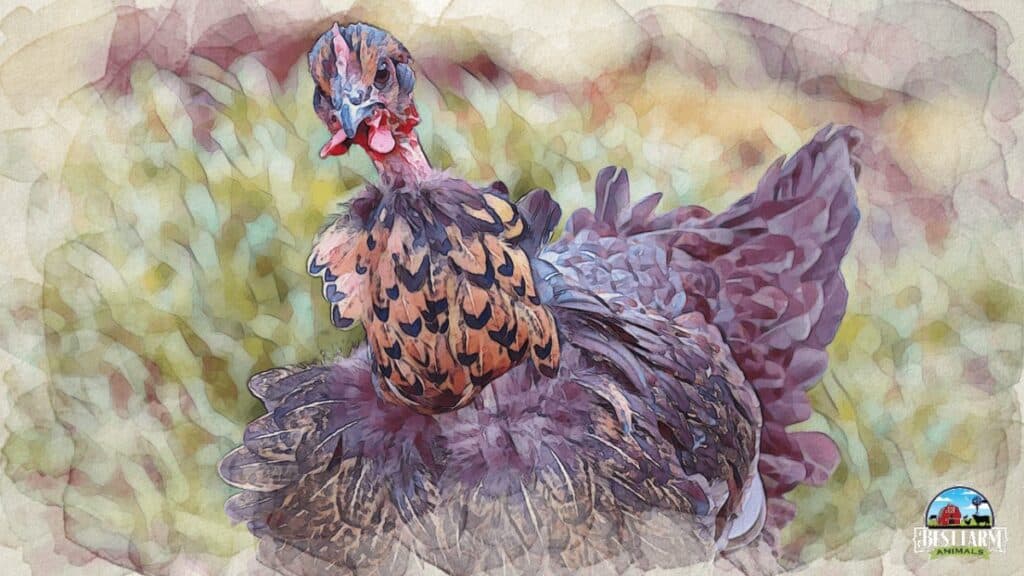It didn’t take long after getting chickens to notice their peculiar habit of rolling in the dirt. I had never seen that before! Since that time, I have learned that rolling in the dirt is very important for chickens. It’s an essential part of their health.
Why Do Chickens Roll in the Dirt? Chickens roll in the dirt because it’s their way of bathing! Chickens roll around in dirt or sand to remove excess oil from their feathers and kill parasites such as mites, fleas, and lice. Chickens don’t bathe in water like ducks, plus a dirt bath is the most effective way they have to clean themselves.
Even if you’re chickens are clean and well cared for you’ll want to provide them a place to bath, if you don’t they’ll scratch and dig until they make a place for themselves. It is their natural instinct.
My Chicken is in the Dirt! Why Do They Roll, Play, Lay, & Dig?
When a chicken rolls and plays in the dirt- it’s called a dust bath. Chickens roll, play, lay, or dig around in dirt or sand as a way to remove excess oil from their feathers and to kill parasites such as mites, fleas, and lice.
Dust bathing helps protect chickens against parasites and they love it! Don’t worry about how dirty they seem to be getting, once they’re done they will shake off the excess dust and only a thin layer next to their skin will remain. This barrier helps keep the mites, fleas, lice, and other parasites out of their skin.
Whether your chickens are free range or penned in you should provide them with a place to bath. This place should be covered to keep the rain out and big enough for them to extend their wings. It doesn’t need to be too deep, maybe four to six inches is all.
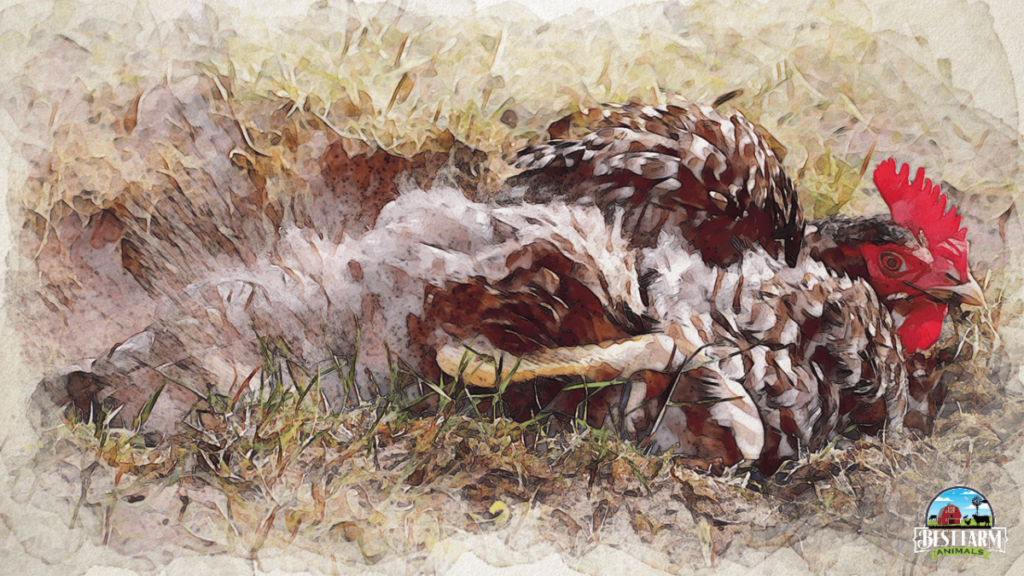
Do Chickens Eat Dirt?
Chickens do not eat dirt. In addition to actual dirt, chickens will eat seeds, insects and worms found in the dirt. Chicken’s eat dirt and sand to help them with digestion. Chicken have no teeth and the course dirt helps them to grind up their food. They will also eat small pebbles and rocks for this purpose.
Dirt stays in their gizzards ready to grind when they eat. This helps them to better digest their food. Eating dirt won’t hurt your chickens. Their stomachs are already built to digest the bugs, germs, worms, and other leftovers found in the dirt.
If your chickens seem to be eating a lot of dirt, and not just the food found in the dirt, they may have a mineral deficiency. Depending on where you live, your soil may be high in certain minerals that your chickens may be naturally speaking out. Check their diets to make sure they are getting enough grains, meat, and other minerals.
Do chickens like wet dirt? Chickens do not like wet dirt or mud, explaining why they normally cluster together in dry places after rain. Wet dirt can stick to the bodies and provide a conducive environment for bacterial growth. It makes them easily contract diseases like botulism, respiratory illnesses, and coccidiosis. Provide them with dry, loose soil for bathing.
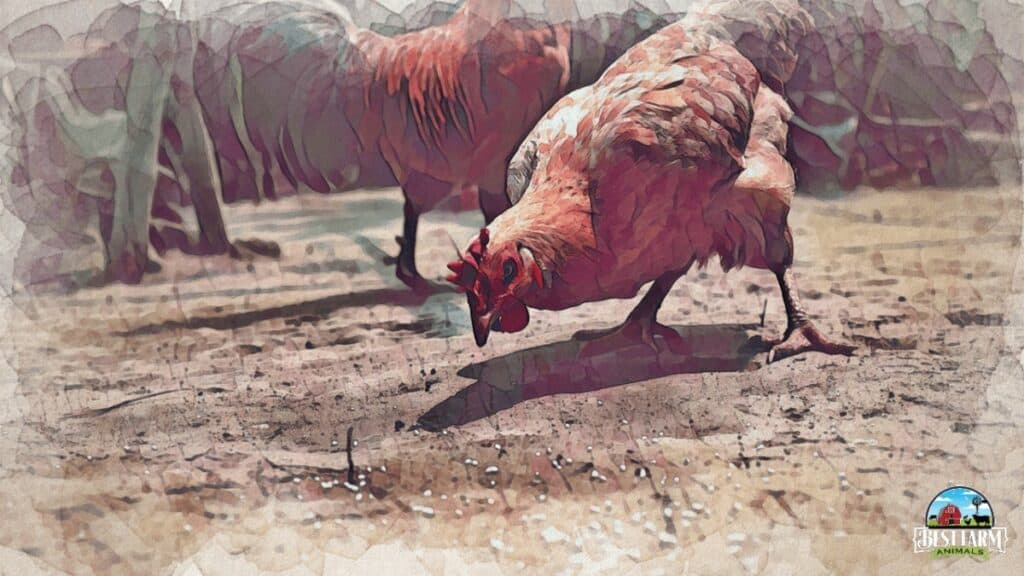
Do Chickens Need Water To Bathe In?
Chickens don’t need water baths. They take dust baths to clean themselves. But a water bath won’t hurt them either. If you give them a bath in water, ensure that the shampoo or soap doesn’t dry out their skin and feathers. Shampoo can cause chickens irritation and other health issues.
Even if you bath them with water you’ll still want to provide a dust bath for them. You may even see your chickens go take a dust bath to wash off your water bath!
How To Remove Dirt From Chickens With A Water Bath
When your chicken is too dirty, you can clean her up. Normally, you can simply brush any excess dirt off your hen. But, if you have a show chicken, you might need to wash her prior to showing her at the fair or in an emergency, such as if you have a prolapsed hen.
- Fill a sink or trough with warm water and dip your chicken into it, allowing her to stay for a few minutes.
- Take her out of the water and place her on a draining board or any flat surface. Use a toothbrush to scrub loose dirt off the chicken.
- Return the chicken into an empty trough and pour clean, warm water over her, then apply poultry or baby shampoo on her.
- Agitate the lather on the chicken’s feathers, ensuring it covers the entire body except for her head, particularly the eyes.
- Pour warm water over the chicken to rinse her. Do this repeatedly until you remove the lather entirely.
- Allow the chicken to dry. You can wrap the chicken in a towel to remove excess water and keep her warm.
- Use a cotton bud to wipe the chicken’s nostril and beak to remove any remaining dust or dirt.
- You can use a hair dryer at the lowest heat and power setting to dry your chicken. Blow the chicken’s body in the direction of feather growth, starting from the head and moving downwards.
Stop using the hair dryer when the hen lifts her wings. This could be a sign she’s feeling too hot. Allow her to cool down before you continue. You can also place her by a heat lamp, or if its warm, allow her to air dry.
Do Chickens Need Dust Baths In The Winter?
Even when there is snow outside and it’s cold, chickens need to take dust baths. Snow often makes it so that there isn’t dry dust for chickens to bath in. But, even with snow, chickens still fight lice, mites, and other parasites. That means that they will need to bathe in mud
If your ground is frozen in the winter, you must provide them with a dust bath. Make sure their dust bath is in a sunny area, possibly under a window in their coop since chickens won’t usually bath in the dark. You will need to make sure to keep it clean and refresh it every week or so.
How To Create A Chicken Bath: Best Kind of Dirt
Chickens like rolling in loose dry soil, grass and sand. The best dirt for chickens will be a loose soil, free from rocks or pebbles. I’ve provided a sandy area for my hens before, but some hens love to dirt bathe in the grass or regular dirt. Compacted soil is not as good for chickens to enjoy a dirt bath.
If you keep your chickens penned in you’ll want to make them a dust bath and place it inside their run. You can use something as small as a kitty litter box, a washtub, or a kiddie pool.
Add sand, dirt, and wood ash. You could use the cooled ash from your wood-burning stove or from an outdoor firepit. You can add wood shavings as well.
Some people like to add diatomaceous earth (DE) to the soil and chicken bedding. If you add DE make sure it is food grade. Otherwise, it could harm your chickens, especially if they breathe it in. Those that use DE choose it because of its natural insecticide properties to help kill and keep the parasites away.
Once your chicken bath is created, you can put it in the coop with your chickens and roosters. I recommend keeping it at least a foot away from the sides of the coop. You don’t want predators such as raccoons to be able to reach in and kill your chickens while they’re bathing.
Another thing to keep in mind, you will want to change out the dirt/dust mixture every few weeks to keep it clean. Sometimes, they use their bath as a toilet, so keeping it clean is a must. You could use a kitty litter box, kiddy pool, or something else similar in size.
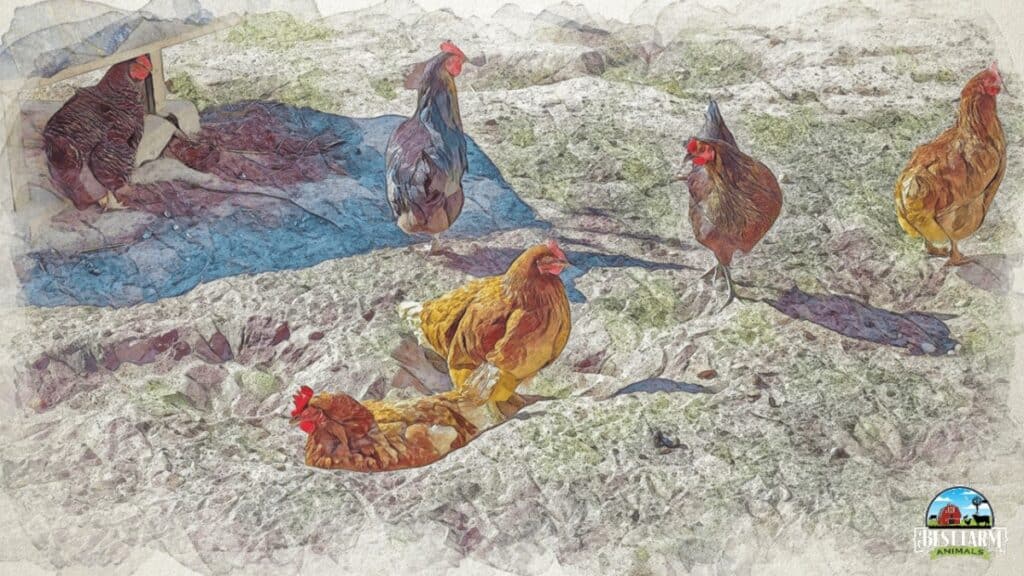
What Is Diatomaceous Earth?
Diatomaceous Earth (DE) is sediment found in rivers, lakes, and the ocean. It is made of fossilized algae known as diatoms. The skeletons are made from silica, a natural pesticide.
Food grade DE has been purified and is said to have many health benefits. This is what you will put in your chickens’ dust bath if you choose to use it. Non-food grade DE can be harmful, especially if it is inhaled so make sure you check the label when purchasing DE.
Chickens In Dirt FAQs
Can chickens drink water with dirt in it? Chickens don’t like drinking dirty water. Water with poop, dirt, or pine shaving is a deterrent to them. So, you need to change their drinking water constantly. Dirty water is a cause of many illnesses and worms in chickens. Unfortunately, They like putting dirt in their drinking water when cleaning their beaks.
Do chickens preen themselves? Chickens preen themselves. They need to replenish the oils on their feathers just like other poultry. There is a gland on the back of their tails that release oil. Chicken’s get a drop of oil on their beaks and rub it on their feathers to keep them in good condition. Preening also helps new feathers get loose of their sheaths and helps get rid of any bugs that have gotten in their feathers.
Why are my chickens scratching themselves?
If your chickens are scratching themselves, instead of the ground, they likely have lice. Lice can spread quickly from bird to bird. Your chickens will scratch and peck at themselves, have reduced egg production, and may start losing weight. To get rid of lice you will need an insecticide that is not harmful to chickens. If a lice infestation isn’t taken care of quickly you could start losing your flock.
Do chickens like a water bath? Most chickens won’t like a water bath unless they are bathed regularly from a young age. Then, they can learn to enjoy a water bath. Chickens don’t naturally enjoy getting wet because water takes away their ability to maintain their ambient body temperature through their feathers. With the right training, and care- you can bathe your chickens, but they don’t need a bath to stay healthy.
Why are my chickens laying eggs in the dirt? Chickens lay eggs in the dirt if the nests are placed at inaccessible or uncomfortable places. Chicken will avoid nests that are too hot or too cold. They can also lay eggs in the dirt to hide them from perceived predators. Some chickens lay eggs in the dirt because they are unfamiliar with nests and still need to learn how to use them.
My Favorite Chicken and Duck Supplies
This list contains affiliate products. Affiliate products do not cost more but helps to support BestFarmAnimals and our goal to provide farm animal owners with accurate and helpful information.
Manna Pro Oyster Shell keeps eggs strong. Before I gave my chickens oyster shell, I had the oddest eggs, many with weak and irregular shells. Now, I don’t have an issue.
Layer Feed by Manna Pro. I like pellets rather than crumbles as my chickens eat them better and less gets wasted or scavenged by rodents. A good layer feed makes the difference in hens laying many more eggs.
My chickens love this mealworm treat, which gives added protein, something that’s great during molting and winter months.
There are many ways to feed and water your chickens. I like this food and water setup the best because it reduces waste, saves me time feeding and watering, and keeps the food fresh longer. Except, in the winter, I use a heated waterer. The only problem is the heated waterers need to be replaced every few years.
I love this chicken veggie hanger. It makes it easy to give your chickens produce from the garden and keep them occupied in the winter with a fresh head of lettuce.
These chicken toys are a hoot! They will help curb bullying and keep your chickens active, especially in the winter when hens tend to get more lethargic.
Conclusion
Dust-bathing is essential for your chickens because it is the best way to keep them clean and pest-free. Chickens will find a place to dust bathe even if you have never provided your chicken with a specific place.
